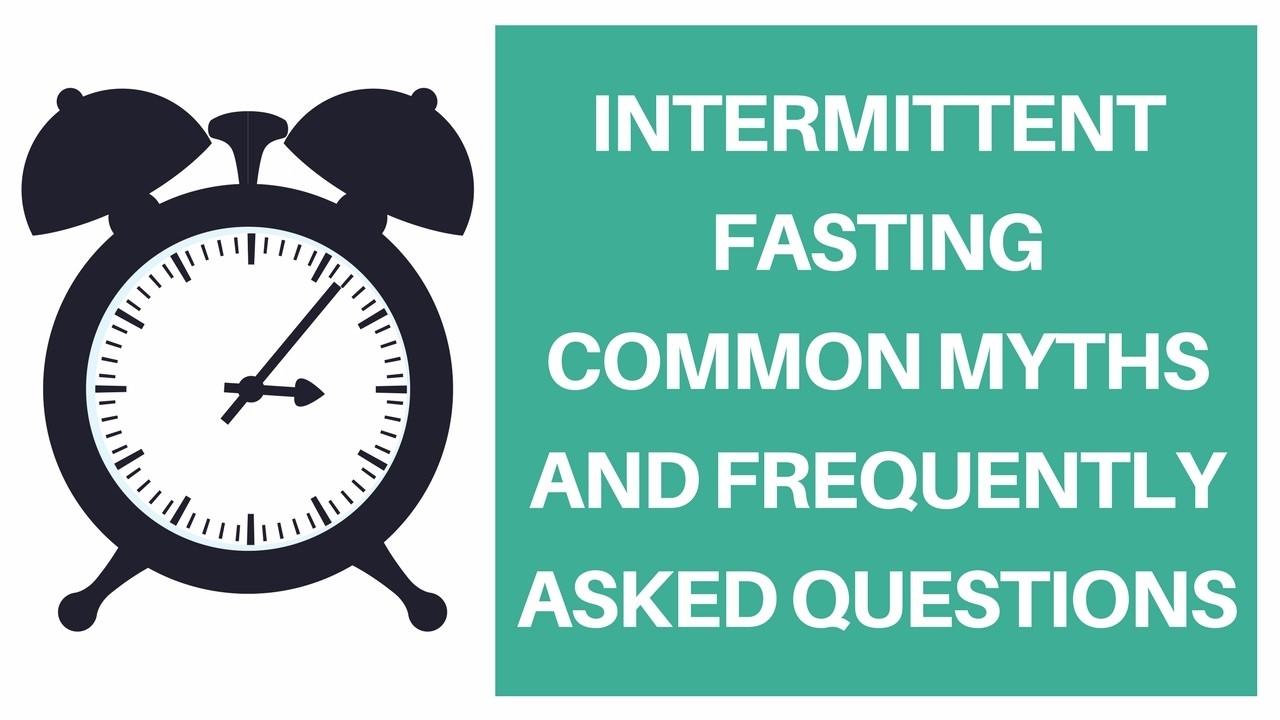Intermittent Fasting: Common Myths + FAQ

Let's face it, there are a lot of myths and even more questions surrounding intermittent fasting. Before deciding to experiment with intermittent fasting (and ultimately falling in love with it) I did a lot of research regarding what those myths are. I took it upon myself to answer my own questions and figure out what other people were asking. Take advantage of my research below and feel free to do your own research as well!
Busting Common Myths
Fasting is NOT starvation!
It is common for people to believe that if you refrain from eating for an extended period of time, your body will hold onto body fat instead of using it for energy. Shifting away from thinking about calories and leaning into more whole foods and relying on healthy fats like avocado, coconut oil, and olive oil can promote fullness and improve the benefits of fasting.
Fasting will NOT lead to a decrease in muscle mass.
Contrary to popular belief, the human body responds to fasting by downregulating protein catabolism and upregulating growth hormones.
Some research shows that intermittent fasting alone may not decrease your body fat percentage, but when the fasting is paired with resistance training, lean mass can be retained and/or enhanced.
Frequently Asked Questions
Q. Is there anyone that shouldn’t intermittent fast?
A. Some women have experienced hormonal changes that lead to amenorrhea. Amenorrhea is the loss of a woman’s menstrual cycle for 3 consecutive cycles. Women can intermittent fast but should be on the lookout for abnormalities with their menstrual cycle. Start small and listen to your body. If it doesn’t feel right, assess your IF strategies and adjust accordingly. If it does feel right, continue with a watchful eye! Individuals with a history of eating disorders or disordered eating should probably steer clear from intermittent fasting as well. Women trying to conceive may not benefit from intermittent fasting and should discuss this with their provider.
Q. What can I drink during my fasting period?
A. Non-caloric beverages like water, coffee, and tea are fine during the fasting period. If you can’t go without adding a small amount of cream to your coffee, that is fine, but be sure to not add any sugar to your coffee unless you want to spike your insulin and negate the positive effects of lower blood glucose.
Q. Can I take supplements during the fasting period?
A. Yes, non-caloric supplements are fine during the fasting period. It is important to note that fat soluble vitamins are better absorbed when consumed with fat. If you are taking a fat soluble vitamin supplement, you might want to consider taking it with fat-containing foods.
Q. Is exercise okay?
A. YES, absolutely! Exercising in a fasted state might even encourage your body to burn fat for fuel. That being said, listen to your body. If exercising during a fast doesn’t feel right, don’t do it!
This article does not take the place of tailored advice from your healthcare professional. See the disclaimer in the footer below for more information.
If you are looking for a tour guide to help you navigate this cutting edge nutrition and gut healing, please email me at [email protected]
Sources
Dr. Bert Herring – Appetite Correction, Intermittent Fasting, Fast-5 Diet and More. (n.d.). Retrieved June 05, 2017, from http://www.fast-5.com/
Fung, J., & Mercola, J. (2016, October 16). The Complete Guide to Fasting: A Special Interview With Dr. Jason Fung. Retrieved June 02, 2017, from http://articles.mercola.com/sites/articles/archive/2016/10/16/complete-guide-fasting.aspx
Gunners, K. (2016, August 16). 6 Popular Ways to do Intermittent Fasting. Retrieved May 23, 2017, from https://authoritynutrition.com/6-ways-to-do-intermittent-fasting/
Gunners, K. (2016, August 16). 10 Evidence-Based Health Benefits of Intermittent Fasting. Retrieved May 28, 2017, from
https://authoritynutrition.com/10-health-benefits-of-intermittent-fasting/
Gunners, K. (2016, August 16). Intermittent Fasting 101 - The Ultimate Beginner's Guide. Retrieved May 23, 2017, from https://authoritynutrition.com/intermittent-fasting-guide/
Hayward, S., Outlaw, J., Urbina, S., Burks, B., Holt, J., Stone, M., … Wilborn, C. (2014). Effects of intermittent fasting on markers of body composition and mood state. Journal of the International Society of Sports Nutrition, 11(Suppl 1), P25. http://doi.org/10.1186/1550-2783-11-S1-P25
LLC, C. C. (2017, January 24). Zero - Fasting Tracker on the App Store. Retrieved June 05, 2017, from https://itunes.apple.com/us/app/zero-fasting-tracker/id1168348542?mt=8
MyCircadianClock | Salk Institute. (n.d.). Retrieved June 05, 2017, from https://mycircadianclock.org/
Pilon, B. (n.d.). Intermittent Fasting For Weight Loss and Health: Top 8 Benefits. Retrieved May 31, 2017, from http://www.eatstopeat.org/intermittent-fasting-for-weight-loss-and-health-top-8-benefits/
Patel, E. K. (2012, November 01). How do I increase insulin sensitivity? Retrieved June 05, 2017, from https://examine.com/nutrition/how-do-i-increase-insulin-sensitivity/
Patrick, R. (2016, June 30). Dr. Satchin Panda on Time-Restricted Feeding and Its Effects on Obesity, Muscle Mass & Heart Health. Retrieved June 05, 2017, from https://www.youtube.com/watch?v=-R-eqJDQ2nU
The Beginner's Guide to Intermittent Fasting. (2017, May 17). Retrieved May 23, 2017, from https://www.nerdfitness.com/blog/a-beginners-guide-to-intermittent-fasting/
Do you need a detox?
Getting "too old" to handle alcohol?
Sensitive to smells or metals?
Skin issues?
Detox isn't just juice cleanses & snake oils. It's a process that our body is trying to do all day long.
Take the quiz to find out if it's time for a detox.




